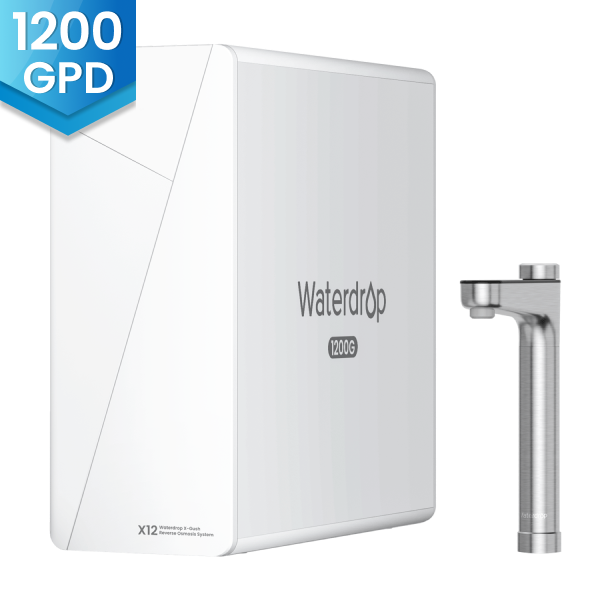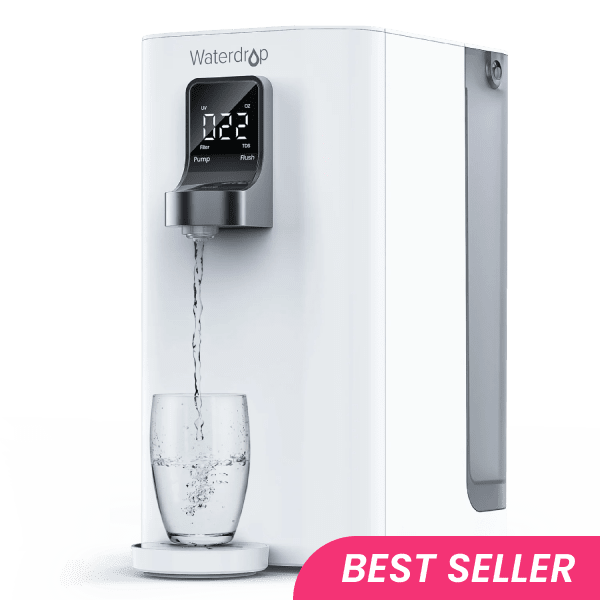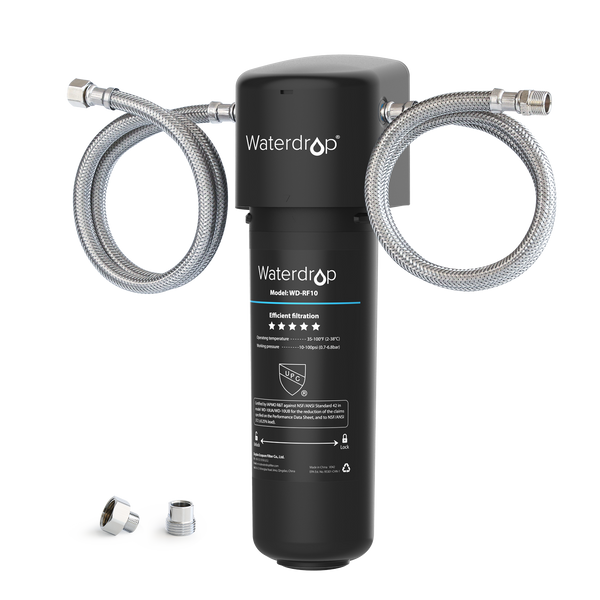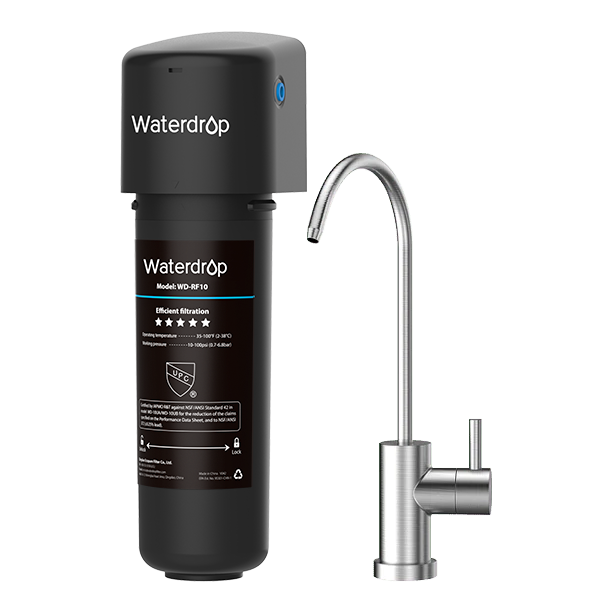The Side Effects and Uses of Distilled Water as Drinking Water
by Dr. Jonathan Doyle - Updated May 05, 2023
Health trends are on the rise, as we see individuals take on new diets, exercise regimens, and more. People are growing more and more concerned over the health, as more begin paying attention to the quality of the water they are consuming. We all know the hidden dangers lurking in many water sources, further highlighting the importance of filtering or otherwise purifying drinking water. Although many homeowners wish to obtain pure drinking sources, many go the route of utilizing distilled water, instead.
Understanding Distilled Water
The process of distillation is very specific, wherein water is boiled into vapor and condensed back into a liquid form. The form of distilled water is commonly known as H2O. As such, many people fall for the guise that distilled water is clean solely because it is free from any impurities. This results in large numbers of people turning to distilled water, rather than filtered, etc.
Is It Safe to Drink Distilled Water?
Distilled water has had vital minerals removed, so it must be consumed with a balanced diet. Many people consider the flavor of distilled water to taste rather bland or flat. Healthy adults, consuming a balanced and diverse diet, will not experience any side effects of drinking it. However, if you are a chronic drinker of distilled water, and are not careful to eat a varied diet, you could run into unfavorable consequences.
What Is Distilled Water Used For?
Distilled water is pure and has, therefore, found a wide range of applications in pharmaceutical and industrial setups. It also plays an essential role in vehicles’ cooling systems and steam irons.
In addition, most medical procedures and surgeries require distilled water. The same goes for sterilization of medical equipment, medical cross-examinations, and cleaning and disinfecting wounds. Hospital meals are prepared with sterilized water, and laboratory personnel use it to clean and wash their hands.
What Is the pH of Distilled Water?
We can describe pH as the ratio of the total number of hydrogen ions to the total amount of substances in a solution. Theoretically, distilled water is expected to have a pH of 7.
Distillation is a chain of processes that starts with boiling the water while leaving the steam to condense in a tube and ultimately collecting the condensed water in a clean and sterilized container. Water often contains several dissolved substances. While some of these substances vaporize during boiling, salts and other solid solutes remain.
Such volatile solutes can be removed from the water using advanced distillation methods. When this happens, the collected condensate is free of these solutes, ensuring the pH of the collected water is 7. The best way to get an accurate pH of distilled water is to measure it immediately after distillation.

Does the pH of distilled water remain constant?
No, the pH of distilled water does not remain constant. In contrast, it can change after some time. A decrease in pH is possible if carbon dioxide (CO2) is absorbed from the air into the water, leading to the formation of carbonic acid (H2CO3). This process only stops when the exchange process between the atmosphere and the solution reaches an equilibrium.
A few factors affect the rate of pH change, including the surface area of the water, the temperature, and the amount of carbon dioxide in the air. One way to keep the pH of the distilled water constant for a long time is to store it in a sealed container, ensuring it does not absorb CO2 from the air around it.
Distilled water remains one of the purest forms of water, with several applications in major industries that require a neutral pH.
Distilled Water Pros and Cons
While it is true that distilled water has been thoroughly processed to filter away any harmful substances, it also filters out beneficial minerals and salt. As with anything, there are pros and cons of consuming distilled water, as well as other options that may be more favorable to you. Let's explore.

Pros
Although distilled water has gone through many processes to filter harmful substances, it also filter beneficial mineral elements.
Cleanses the Human Body
Because distilled water is pure, and doesn't contain additives, it is capable of cleansing the body from impurities.
Reduces Harmful Substances
Pathogens, the majority of water-borne pathogenic bacteria, and more are incapable of surviving the process of distillation.
Reduces Overall Risk of Disease
The EPA allows for drinking water to contain trace amounts of chemicals deemed harsh. With distilled water, though, the presence of said chemicals is basically zero. Individuals who live with an autoimmune disease, and are at risk of becoming sick easily, may benefit from drinking distilled water verses filtered, etc.
Cons
The dangers of only consuming distilled water or low mineral water are as follow.
Taste
People tend to avoid tap or filtered water because it is flat, and not appealing. This includes distilled water, and causes many individuals to drink less water than they truly need.
Electrolyte Imbalances
A study conducted by the WHO surmised that drinking distilled water may lead the body to lose precious electrolytes. This issues associated with drinking less electrolytes causes people to experience fatigue, muscle cramps, dizziness, organ failure, and more.
Health Implications
Distilled water is pure, and doesn't contain nutrients. As such, distilled water easily absorbs other elements. When it comes into contact with the air, it can even absorb carbon monoxide. It's important to ensure you are not already mineral deficient if you are a habitual user of distilled water.
Distilled Water for Babies
There have been common conversations and questions about distilled water for babies, including:
Can babies drink distilled water?
Yes, babies can drink distilled water. It is safe, and there are no risks—you only need to adopt a wholesome diet to balance it out.
Is it safe to use distilled water for baby formula?
Yes, you can use distilled water to make baby formula. While there are no nutrients in distilled water, the formula has enough to compensate for that.

Is distilled water good for babies?
It is safe to prepare your baby’s formula with distilled water. However, it should not be your baby’s only water source. Distilled water has undergone complete purification—a process that removes every beneficial mineral in the water. The water is also unsuitable for drinking if you want to replenish the nutrients lost during sweating, as it lacks the required nutrients. Finally, it is best to consider other water sources to ensure you do not cause an electrolyte imbalance due to excessive urination.
Distilled Water VS Purified Water
Distilled water is a form of purified water that has undergone the distillation process. However, distillation is just one of many purification processes. Others include reverse osmosis, ultrafiltration, etc.
As pure as distilled water is, there are healthier water types out there. Drinking only distilled water means your body will be deprived of some beneficial minerals, also called electrolytes. Electrolytes are crucial to all cellular processes in the human body.
The Waterdrop Reverse Osmosis System X12 offers a high-speed, tankless water filtration at an impressive 1200G with an 11-stage precision filtration mechanism, capable of removing contaminants such as lead, chlorine, and PFAS, while enhancing water with essential alkaline minerals like calcium and magnesium.
It not only improves health, taste of food and beverages, but can also alleviate stomach acid discomfort. Boasting a smart design, the system includes a digital faucet with functions such as precise water dispensing and TDS/filter lifespan monitoring. It's engineered for space-saving and simple DIY installation, re-mineralizing water to create natural-tasting, fresh, and healthy water accessible directly from your kitchen.
Purified water has undergone a process of purification to remove the harmful microorganisms and chemical substances that may be present. For example, when purifying water through reverse osmosis, the water is forced through a semi-permeable membrane with several pores of 0.0001 microns in size. This passage removes harmful components like microorganisms, minerals, and chemicals. Ozonation is another purification process—it uses ozone instead of harsh chemicals to remove contaminants in drinking water.
Distilled Water VS Spring Water
Spring water is sourced from underground water rather than municipal sources. Therefore, it tastes better rather than flat or boiled. It is also more refreshing and crispier than distilled water.
We drink water for several reasons but mostly for the amount of essential nutrients it adds to our bodies. Water often contains electrolytes, helping people meet their daily requirements of sodium and potassium. Likewise, for every drop of water that gets into our systems, it adds more body and brain oxygen and enhances our digestion systems.
When comparing distilled water to spring water, it is clear that spring water is the superior option for your health. It contains essential nutrients and is recognized for its various health benefits.
Learn more about the details about the different types of water.
Is Boiled Water the Same as Distilled Water?
Boiled water and distilled water are not the same. In the case of boiled water, the temperature was raised until it boiled. This process kills several bacteria that may affect the health of anyone who drinks such water raw without boiling.
Conversely, distilled water has been subjected to a purification process that removes all impurities, including microorganisms and even beneficial minerals.
Why Is There A Shortage of Distilled Water?
Distilled water has numerous uses outside of drinking. High demand, slow production, excessive use, and a few other reasons are responsible for the shortage of distilled water.
While distilled water is in short supply at some locations, there isn’t a reason to panic. You can make distilled water at home. Check the steps to make homemade distilled water.
Final Thoughts
As time goes on, we find more and more families interested in maintaining or improving their overall health. In terms of a healthier lifestyle, these are steps in the right direction. However, there are still have a few ways to make adjustments. Water is considered to be a vital aspect of health lifestyles. When you aren't drinking the best water available, it may dangerously affect your health. If distilled water is your favored water of choice, ensure you are adding minerals back into your body, in order to avoid loss of nutrients or even dehydration.
Recommended Reading:
Contaminants Detected in Fruitland Water Special Service District
30
Contaminants
EXCEED EWG HEALTH GUIDELINES
EXCEED EWG HEALTH GUIDELINES
30 Total Contaminants in Your Water
Water Provider
Fruitland Water Special Service DistrictPopulation Affected
120,000Water Source
Ground waterExceeds Guidelines
Others Detected
















